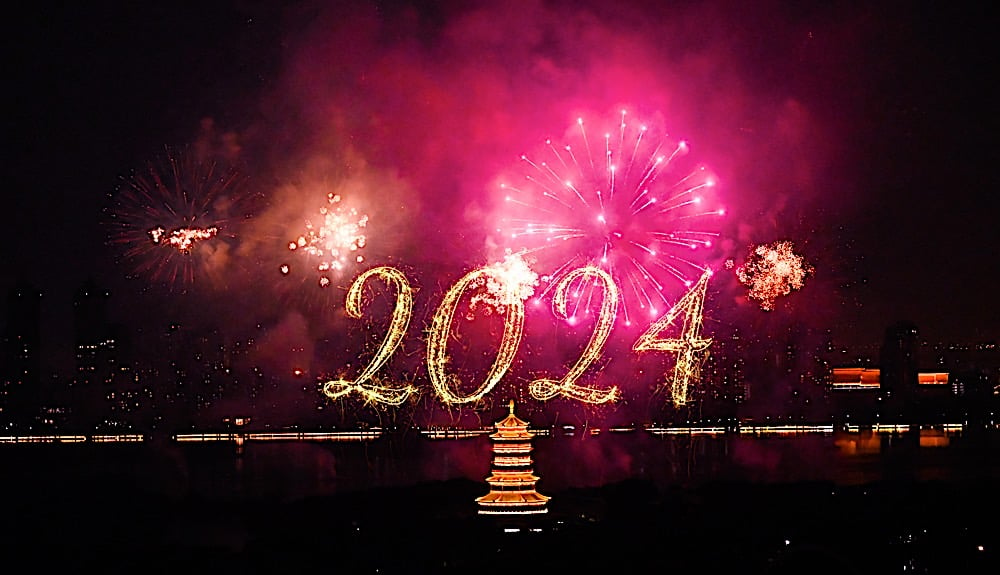
Happy New Year! Buddhists around the world celebrate 2024 at different New Year dates around the world — although the traditions of warm wishes of good fortune and celebration are common to all of them. Also common to all the traditions are some universal customs:
- Celebrate with light to bring in an optimistic New Year. This can be fireworks, candles on altars, colorful lanterns and other festive lights!
- Dharma activities, such as reading Sutra
- Generosity to others — giving to set the tone for aupsiciousness
- First “sight” of the New Year ideally should be a Buddha image (sometimes known as Darshan)
- Wishing others a Happy New Year, good fortune, health and happiness.
On that note —
Happy New Year!
Different Dates on Different Calendars
Why so many dates? Calendar New year is based on the western solar-based calendar. Chinese New Year is based on the lunisolar lunar calendar, while Tibetan New Year is based on the unadjusted lunar calendar. Other “New Year’s” celebrations mark different traditions. January 1 is common to most Buddhists around the world, but the more traditional dates are:
- Calendar New Year: January 1 each year
- Japanese New Year, Shogatsu, also January 1 each year
- Mahayana New Year: January 25, 2024
- Tibetan New Year LOSAR, Year of the WOOD DRAGON: February 10, 2024 — this is the year 2151 in the Tibetan Calendar
- Chinese New Year, Year of the WOOD DRAGON: February 10, 2024
- Theravadan New Year: April 24, 2024
- For more information on the various types of lunar calendar and Dharma Dates, see our full 2024 feature>>
Fireworks are a must on any New Year, bringing in the aupsiciousness of light. If you can’t go live, there will be plenty of coverage online.
Western New Year falls on January 1 each year, while Mahayana Buddhist New Year, Chinese New Year, Theravadan New Year and Tibetan New Year are all celebrated on different dates on the lunar calendar. Some of us celebrate them all — not just as an excuse for wishing our fellow sentient beings good fortune and auspiciousness, but also — well, who doesn’t like a celebration? It is also a time of dedicated Dharma practice, especially for the purification of past negativities. When are these various dates?
Dates of New Year 2024
- Calendar New Year: January 1 each year
- Japanese New Year, Shogatsu, also January 1 each year
- Mahayana New Year: January 25, 2024
- Tibetan New Year LOSAR: February 10, 2024
- Chinese New Year: February 10, 2024
- Theravadan New Year: April 24, 2024
Each of these New Year dates are full of symbolism and meaning. One popular New Year tradition is to set off fireworks, which represent the brightness and joy of the New Year. Another common New Year practice is to ring bells, which symbolize good fortune and hope for the New Year ahead. Additionally, many Buddhists will visit temples on New Year’s Day to pray for blessings and prosperity for the year ahead. In Tibetan tradition, prior to New Year (which falls on February 21 this year!) we engage in purification practices, such as Vajrasattva, to purify all obstacles and negativities as we go into a new year.
Common traditions for New Years in Buddhism
Common to all (most) Buddhist traditions are:
- Celebrate with light to bring in an optimistic New Year. This can be fireworks, candles on altars, colorful lanterns and other festive lights.
- Dharma activities, such as reading Sutra
- Generosity to others — giving to set the tone for aupsiciousness
- First “sight” of the New Year ideally should be a Buddha image (sometimes known as Darshan)
- Wishing others a Happy New Year, good fortune, health and happiness.
Wishing you a wonderful New Year filled with joy, love, and peace. Happy New Year!
Appendix: Linosolar lunar versus lunar
The months in a lunisolar calendar are based on the repeating phases of the Moon. To keep up with the solar year and season, however, some additional intercalation rules must be applied to balance out lunar cycles with those of sun-based calendars. As such, it is distinct from regular lunar calendars which lack this “adjustment.”

